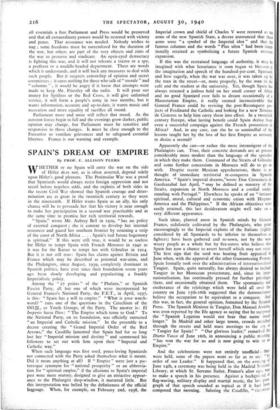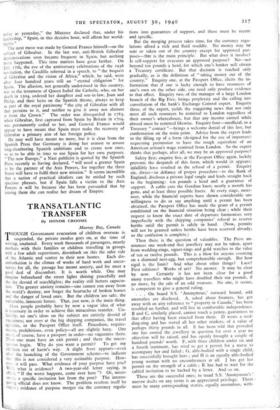SPAIN'S DREAM OF EMPIRE
By PROF. E. ALLISON PEERS
WHETHER or no Spain will enter the war on the side of Hitler dces not, as is often asserted, depend solely upon Hitler's good pleasure. The Peninsular War was a proof that Spaniards would always resist foreign oppression and not recoil before hopeless odds, and the exploits of both sides in the recent Civil War showed that Spanish courage and deter- mination are as great in the twentieth century as they were in the nineteenth. If Hitler wants Spain as an ally, his only chance will be to persuade her that his victory is near enough to make her participation in a second war practicable and at the same time to promise her rich territorial rewards.
" Spain," wrote Mr. Aubrey Bell in 1929, " has no policy of external conquest ; she is content to develop her internal resources and guard her southern frontier by retaining a strip of the coast of North Africa . . . . Spain's real future hegemony is spiritual." If this were still true, it would be as useless for Hitler to tempt Spain with French Morocco in 1940 as it was for the Kaiser to tempt her with Gibraltar in 1914. But it is not still true: Spain has claims against Britain and France which may be described as potential war-aims, and the Phalangists, since August, 1939, completely dominant in Spanish politics, have ever since their foundation seven years ago been slowly developing and popularising a frankly Imperialistic policy.
Among the " 27 points " of the " Phalanx," or Spanish Fascist Party, all but one of which were incorporated by General Franco's National Party, the F.E.T., in April, 1937, is this: " Spain has a will to empire." " What is your watch- word? " runs one of the questions in the Catechism of the OO.JJ., or Youth Groups, of the Party. The answer is : El lmperio hacia Dios: "The Empire which turns to God." To the National Party, on its foundation, was officially entrusted " an Imperial and Catholic mission." In the preamble to a decree creating the " Grand Imperial Order of the Red Arrows," the Caudillo lamented that Spain had for so long lost her " Imperial mission and destiny " and summoned his followers to set out with him upon their " Imperial and Catholic way."
When such language was first used, peace-loving Spaniards not connected with the Party asked themselves what it meant. Did it mean anything at all? If " Empire " were just a pic- turesque synonym for " national prosperity " or an abbrevia- tion for " spiritual empire," if the allusions to Spain's imperial past were mere oratory, designed to give an attractive appear- ance to the Phalangist shop-window, it mattered little. But this interpretation was belied by the definiteness of the official language. When, for example, on February and, 1938, the Imperial crown and shield of Charles V were restored as the arms of the new Spanish State, a decree announced that these arms were " a symbol of the Imperial idea " and that the famous columns and the words " Plus ultra " had been inten- tionally retained as symbolising a future Spanish overseas expansion.
If this was the restrained language of authority, it may he imagined with what luxuriance it soon began to blossom its the imagination and speech of the hundred-per-cent. Spaniard, and how eagerly, when the war was over, it was taken up by the man in the street—or, more properly, by the man in the café and the student at the university. Yet, though Spain has always retained a jealous hold on her small corner of Africa and no good Spaniard ever fails to dream occasionally of a Mauretanian Empire, it really seemed inconceivable that General Franco could be reviving the post-Reconquest pro- jects of Ferdinand the Catholic and looking for a new Ximenes de Cisneros to help him carry them into effect. In a twentieth century Europe, what lasting benefit could Spain derive from even a successful campaign against the French possessions in Africa? And, in any case, can she be so unmindful of the lessons taught her by the loss of her first Empire as seriously to desire a second?
Apparently she can—or rather the more intransigent of the Phalangists can. True, their concrete demands are at present considerably more modest than the language of the speeches in which they make them. Command of the Straits of Gibraltar and some further concessions in Morocco will do to go on with. Despite recent Mexican apprehensions, there is no thought of immediate territorial re-conquests in Spanish America. " Spain's imperial dreams,"wrote Don Crescencio de Gardeazabal last April, " may be defined as mastery of the Straits, expansion in North Morocco and a cordial under- standing with Portugal." Elsewhere he speaks of an " intimate spiritual, moral, cultural and economic union with Hispano- America and the Philippines." If the African objectives were easily attained, this last desideratum might well take on a very different appearance.
Such ideas, planted anew in Spanish minds by General Franco, sedulously cultivated by the Phalangists, who point encouragingly to the Imperial exploits of the Italians (rightly considered by all Spaniards to . be inferior to themselves as fighters) have been gathered and re-sown, not by the war- weary people as a whole but by fire-eaters who believe that Spain has now a chance to assert herself which may not recur. The first sign that the seed was bearing fruit appeared in June when, with the approval of the other Guaranteeing Powers, Spain formally took over the administration of internationalised Tangier. Spain, quite naturally, has always desired to include Tangier in her Moroccan protectorate, and, since its inter- nationalisation, has continually pressed for further privileges there, and occasionally obtained them. The spontaneity and exuberance of the rejoicings which were held all over the country on June 5th-16th suggested that the demonstrators believe the occupation to be equivalent to a conquest. And this was, in fact, the general opinion, fomented by the Spanish Press. The Spanish Minister in Tangier, Don Manuel Arnieba, was even reported by the Efe agency as saying that he supposed the " Spanish Legation would not bear that name much longer." In Madrid and other large towns, crowds marched through the streets and held mass meetings to the cry of " Tangier for Spain! " " Our glorious leader," remarked the Diario Vasco of June 16th, in announcing a public meeting, " has won the war for us and is now going to win us an Empire."
And the celebrations were not entirely unofficial ; 60' were held, some of the papers went so far as to say. "bY, order of our Leader." It happened that, on the evening °I. June 14th, a ceremony was being held in the Madrid National Library, at which Sr. Serrano Sufier, Franco's alter ego, was to make a speech in his presence. Against a backgros:nd of flag-waving, military display and martial music, the last pa*" graph of that speech sounded as topical as if it had ben
.
composed that morning. Saluting the Caudillo, " victorious today as yesterday," the Minister declared that, under his leadership, " Spain, in this decisive hour, will affirm her world- rights."
The next move was made by General Franco himself—on the subject of Gibraltar. In the last war, anti-British Gibraltar demonstrations scion became frequent in Spain, but nothing more happened. This time matters have gone farther. On July 17th, the eve of the anniversary celebrations of the 1936 revolution, the Caudillo referred in a speech, to " the bequest of Gibraltar and the vision of Africa," 'which, he said, were after four hundred years still an " eternal obligation " for Spain. The allusion, not generally understood in this country, was to the testament of Queen Isabel the Catholic, who, on her death in 1504, ordered her daughter and son-in-law, Joan and Philip, and their heirs on the Spanish throne, always to keep as part of the royal patrimony " the city of Gibraltar with all that pertains to it, and neither to give it away nor alienate it from the Crown." The order was disregarded in 1783, when Gibraltar, first captured from Spain by Britain in 1704, was permanently ceded to her, and General Franco would appear to have meant that Spain must make the recovery of Gibraltar a primary aim of her foreign policy.
He may well have meant no more, but it is clear from the Spanish Press that Germany is doing her utmost to arouse long-slumbering Spanish ambitions and to create new ones, so as to be able in time to use Spain for her own purposes. " The new Europe," a Nazi publicist is quoted by the Spanish Press recently as having declared, " will need a greater Spain to be the partner of the Axis Powers, for together the three States will have to fulfil their new mission." It seems incredible that a nation of practical idealists can be misled by such specious phrases, but if Spain falls a victim to the Axis Powers it will be because she has been persuaded that by joining them she can realise her dream of Empire.



























 Previous page
Previous page